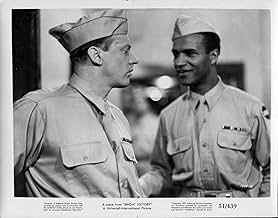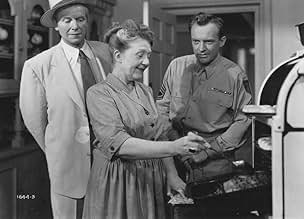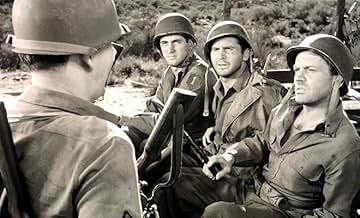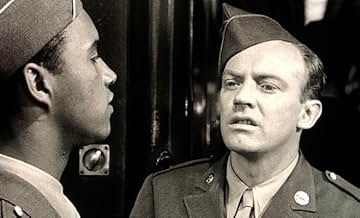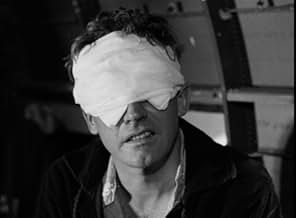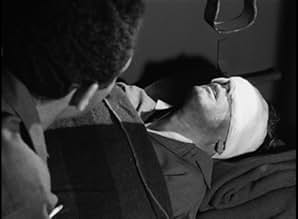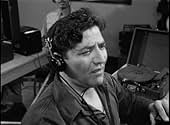PUNTUACIÓN EN IMDb
7,3/10
1,1 mil
TU PUNTUACIÓN
Añade un argumento en tu idiomaAfter he gets blinded by a German sniper's bullet in 1943, Sergeant Larry Nevins begins the long and painful road to recovery.After he gets blinded by a German sniper's bullet in 1943, Sergeant Larry Nevins begins the long and painful road to recovery.After he gets blinded by a German sniper's bullet in 1943, Sergeant Larry Nevins begins the long and painful road to recovery.
- Dirección
- Guión
- Reparto principal
- Nominado para 2 premios Óscar
- 5 premios y 6 nominaciones en total
Julie Adams
- Chris Paterson
- (as Julia Adams)
Reseñas destacadas
In "Dark Victory" the lead goes blind and faces encroaching death. In "Bright Victory" the lead's already blind and faces encroaching life.
The latter seems far more challenging.
Arthur Kennedy's Oscar-nominated performance as Larry buoys this film from start to finish. His excellent naturalistic style is perfect for the returning disabled vet.
Peggy Dow (as Judy) and Julie Adams (as Chris) are both fine as the women in Larry's life. The script is so sensitively written that both female characters are totally believable in their motivations.
James Edwards delivers his usual solid work as Joe, Larry's best friend.
Mark Robson's direction is efficient and level headed, and the photography, editing and music are all extremely tasteful.
This is one of Authur Kennedy's finest hours, amongst a distinguished body of work during a most versatile career.
The latter seems far more challenging.
Arthur Kennedy's Oscar-nominated performance as Larry buoys this film from start to finish. His excellent naturalistic style is perfect for the returning disabled vet.
Peggy Dow (as Judy) and Julie Adams (as Chris) are both fine as the women in Larry's life. The script is so sensitively written that both female characters are totally believable in their motivations.
James Edwards delivers his usual solid work as Joe, Larry's best friend.
Mark Robson's direction is efficient and level headed, and the photography, editing and music are all extremely tasteful.
This is one of Authur Kennedy's finest hours, amongst a distinguished body of work during a most versatile career.
This film was partially filmed on location at Valley Forge General Hospital (and NOT at the actual Valley Forge), in Phoenixville, PA. This hospital was a center for rehabilitating blind soldiers during World War II. Every enlisted man assigned to Valley Forge Gen. Hosp. after 1952 was shown this film as part of their orientation to the hospital.
Some of the interior and exterior shots were done at the hospital. The scenes where the soldier walks toward blank walls was done at the outdoor handball courts at the hospital. Several ward scenes were also shot there.
It was nice to see medics portrayed as something other than just battlefield personnel.
I would love to have a video of this film, but such is not available.
Well acted, and reasonably realistic.
Some of the interior and exterior shots were done at the hospital. The scenes where the soldier walks toward blank walls was done at the outdoor handball courts at the hospital. Several ward scenes were also shot there.
It was nice to see medics portrayed as something other than just battlefield personnel.
I would love to have a video of this film, but such is not available.
Well acted, and reasonably realistic.
Arthur Kennedy is Larry, a man blinded in WW II battle in "Bright Victory," a 1951 film that also stars Peggy Dow, Julia Adams, James Edwards, Will Geer, Jim Backus, and Larry Keating.
Kennedy plays a southern racist whose life plan of marrying his high school sweetheart (Adams) and joining her wealthy father's business comes into doubt when he is shot and his optic nerve shattered during combat.
The film takes the viewer through Larry's training with other blind soldiers as he learns to adjust to a sightless life. One of the men, Joe (Edwards) is black and is his best buddy until Larry makes a bigoted remark (and uses the n word for extra emphasis).
A fellow soldier points out to him that from now on, he probably won't want to ask someone's race and religion before deciding if they pass muster. This sets Larry thinking.
He meets a sympathetic young woman, Judy (Dow), who falls for him but has to let him go home to the life he has there. But when Larry returns to his family, he finds that because he's changed, the world around him has changed, too.
This looks to be a B movie but Kennedy received an Oscar nomination for Best Actor, and the acting in the film is A quality, as is the script and direction. Kennedy is excellent and does one thing, I believe intentionally, that is remarkable. At least to these ears, he has no southern accent in the beginning of the film. When he returns home, you start to hear a southern accent in his voice.
Now, some might say that Kennedy's southern accent was in and out - I don't believe that was the case. He did what a lot of people with an 'acute ear' do - he picked up the accent of those around him. As a blind man, of course, his ear would even be more acute, and in several scenes, he is shown to have a unique "radar" ability for "feeling" when he is near a building, which is considered by the Army to be a unique gift not shared by many. It would then be in character for him to easily fall in and speak with the same intonation as the accents around him.
Kennedy, of course, went on to have a strong career as a character actor (and receive more Oscar nominations) while one of the bit players in the film, Rock Hudson, who is fairly bad even with a couple of lines, hit the superstardom jackpot. Fortunately, Hudson improved greatly before being handed leads.
Julia Adams is lovely (and strongly resembles actress Connie Selleca) as Larry's frustrated girlfriend, and Dow is sympathetic as the girl left behind. After a few more movies, the very pretty Dow quit her film career to marry and subsequently raised five children. Will Geer, Larry Keating, and Jim Backus, three strong character actors, appear in this film as well.
"Bright Victory" is an excellent movie and well worth watching, particularly for the complicated personality created by Arthur Kennedy.
Kennedy plays a southern racist whose life plan of marrying his high school sweetheart (Adams) and joining her wealthy father's business comes into doubt when he is shot and his optic nerve shattered during combat.
The film takes the viewer through Larry's training with other blind soldiers as he learns to adjust to a sightless life. One of the men, Joe (Edwards) is black and is his best buddy until Larry makes a bigoted remark (and uses the n word for extra emphasis).
A fellow soldier points out to him that from now on, he probably won't want to ask someone's race and religion before deciding if they pass muster. This sets Larry thinking.
He meets a sympathetic young woman, Judy (Dow), who falls for him but has to let him go home to the life he has there. But when Larry returns to his family, he finds that because he's changed, the world around him has changed, too.
This looks to be a B movie but Kennedy received an Oscar nomination for Best Actor, and the acting in the film is A quality, as is the script and direction. Kennedy is excellent and does one thing, I believe intentionally, that is remarkable. At least to these ears, he has no southern accent in the beginning of the film. When he returns home, you start to hear a southern accent in his voice.
Now, some might say that Kennedy's southern accent was in and out - I don't believe that was the case. He did what a lot of people with an 'acute ear' do - he picked up the accent of those around him. As a blind man, of course, his ear would even be more acute, and in several scenes, he is shown to have a unique "radar" ability for "feeling" when he is near a building, which is considered by the Army to be a unique gift not shared by many. It would then be in character for him to easily fall in and speak with the same intonation as the accents around him.
Kennedy, of course, went on to have a strong career as a character actor (and receive more Oscar nominations) while one of the bit players in the film, Rock Hudson, who is fairly bad even with a couple of lines, hit the superstardom jackpot. Fortunately, Hudson improved greatly before being handed leads.
Julia Adams is lovely (and strongly resembles actress Connie Selleca) as Larry's frustrated girlfriend, and Dow is sympathetic as the girl left behind. After a few more movies, the very pretty Dow quit her film career to marry and subsequently raised five children. Will Geer, Larry Keating, and Jim Backus, three strong character actors, appear in this film as well.
"Bright Victory" is an excellent movie and well worth watching, particularly for the complicated personality created by Arthur Kennedy.
Of course I always loved Bright Victory, since my dad was one of the blinded veterans used as extras in the movie. I remember him telling me that Kennedy had dark contacts in, and would yell out to remove them as soon as a scene was over.My dad said he felt like calling out, "But I can't remove mine!" It is a wonderful story of many blinded vets, particularly at that time. A captain was accompanying my dad and another blind soldier, who happened to be black, to their homes in GA. When they came to the train station in DC, they were informed that the black man could no longer ride in the same car. Both the captain and my dad were outraged for this soldier who had also gave his sight for his country. A new car was added to the train, and the 3 soldiers had it all to themselves. I was proud of my dad and the captain for taking that stand. They are deceased, but the lesson of the train, and the lesson of "Bright Victory" are both stories I pass on to my child and to my students over 32 years.
Poignant account of blinded war veteran adjusting to civilian life. Though the premise has built-in emotional appeal, that fine actor Arthur Kennedy prevents the tale from becoming too sappy or even sentimental. Understandably, there were a number of these "adjustment" movies made after WWII, The Best Years Of Our Lives (1946), and The Men (1950), to name two. More than the others, I think, BV follows one man's (Kennedy) difficulties in re- integrating with family, love life, and community. Naturally, films of this type sought to be uplifting and optimistic in dealing with a devastating post-war problem. BV is no exception. Then too, the racial subtext is well-handled, bringing to the surface those inner qualities that are often overridden by outer appearance. In that sense, Larry's (Kennedy) perception is ironically sharpened by blindness once he figures out the lesson.
The movie's well-made, using actual locations such as city sidewalks, VA hospitals, and train stations, all of which provide a realistic feel. Then too, what guy wouldn't like being helped along by the likes of Judy (Dow) who resembles June Allyson's sexy older sister. Too bad, her accomplished career was so short. Just as regrettable is the amazing James Edwards, one of the first Blacks to get dignified roles. Seems his pioneering career was over-shadowed by the equally charismatic Sydney Poitier.
All in all, the movie surpasses its time because of the common humanity that appeals beneath one man's courageous struggle.
The movie's well-made, using actual locations such as city sidewalks, VA hospitals, and train stations, all of which provide a realistic feel. Then too, what guy wouldn't like being helped along by the likes of Judy (Dow) who resembles June Allyson's sexy older sister. Too bad, her accomplished career was so short. Just as regrettable is the amazing James Edwards, one of the first Blacks to get dignified roles. Seems his pioneering career was over-shadowed by the equally charismatic Sydney Poitier.
All in all, the movie surpasses its time because of the common humanity that appeals beneath one man's courageous struggle.
¿Sabías que...?
- CuriosidadesTen blind WWII veterans at the hospital appeared as extras and were advisers for this film.
- PifiasThe locomotive pulling the train when Joe arrives home in Florida was not produced by American Locomotive Company until 1950, seven years after the actual event. Diesel locomotives were not used on local trains until after the war years.
- Citas
Larry Nevins: I told ya i wanted security, remember... well I was looking for it in all the wrong places. Nobody can ever give it to you Judy. That way, it costs too much, you gotta make it for yourself.
Selecciones populares
Inicia sesión para calificar y añadir a tu lista para recibir recomendaciones personalizadas
- How long is Bright Victory?Con tecnología de Alexa
Detalles
- Fecha de lanzamiento
- País de origen
- Idioma
- Títulos en diferentes países
- Bright Victory
- Localizaciones del rodaje
- Empresa productora
- Ver más compañías en los créditos en IMDbPro
- Duración
- 1h 37min(97 min)
- Color
- Relación de aspecto
- 1.37 : 1
Contribuir a esta página
Sugerir un cambio o añadir el contenido que falta

